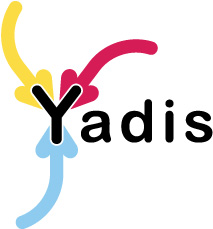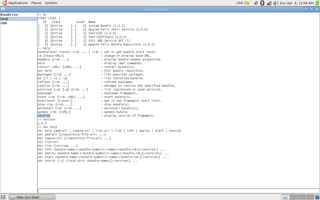
A digital object identifier (DOI) is a persistent identifier or handle used to uniquely identify various objects, standardized by the International Organization for Standardization (ISO). DOIs are an implementation of the Handle System; they also fit within the URI system. They are widely used to identify academic, professional, and government information, such as journal articles, research reports, data sets, and official publications. DOIs have also been used to identify other types of information resources, like commercial videos.
Identity management (IdM), also known as identity and access management, is a framework of policies and technologies to ensure that the right users have the appropriate access to technology resources. IdM systems fall under the overarching umbrellas of IT security and data management. Identity and access management systems not only identify, authenticate, and control access for individuals who will be utilizing IT resources but also the hardware and applications employees need to access.
Security Assertion Markup Language is an open standard for exchanging authentication and authorization data between parties, in particular, between an identity provider and a service provider. SAML is an XML-based markup language for security assertions. SAML is also:

An electronic identification ("eID") is a digital solution for proof of identity of citizens or organizations. They can be used to view to access benefits or services provided by government authorities, banks or other companies, for mobile payments, etc. Apart from online authentication and login, many electronic identity services also give users the option to sign electronic documents with a digital signature.
A federated identity in information technology is the means of linking a person's electronic identity and attributes, stored across multiple distinct identity management systems.

Shibboleth is a single sign-on log-in system for computer networks and the Internet. It allows people to sign in using just one identity to various systems run by federations of different organizations or institutions. The federations are often universities or public service organizations.
Digital identity is the phrase referring to the data that computer systems use to represent external agents, which can be individuals, organizations, applications, or devices. For individuals, it involves an aggregation of personal data that is essential for facilitating automated access to digital services, confirming one's identity on the internet, and allowing digital systems to manage interactions between different parties. It is a component of a person's social identity in the digital realm, often referred to as their online identity.
Internet identity (IID), also online identity, online personality, online persona or internet persona, is a social identity that an Internet user establishes in online communities and websites. It may also be an actively constructed presentation of oneself. Although some people choose to use their real names online, some Internet users prefer to be anonymous, identifying themselves by means of pseudonyms, which reveal varying amounts of personally identifiable information. An online identity may even be determined by a user's relationship to a certain social group they are a part of online. Some can be deceptive about their identity.

OpenID is an open standard and decentralized authentication protocol promoted by the non-profit OpenID Foundation. It allows users to be authenticated by co-operating sites using a third-party identity provider (IDP) service, eliminating the need for webmasters to provide their own ad hoc login systems, and allowing users to log in to multiple unrelated websites without having to have a separate identity and password for each. Users create accounts by selecting an OpenID identity provider, and then use those accounts to sign on to any website that accepts OpenID authentication. Several large organizations either issue or accept OpenIDs on their websites.

Yadis is a communications protocol for discovery of services such as OpenID, OAuth, and XDI connected to a Yadis ID. While intended to discover digital identity services, Yadis is not restricted to those. Other services can easily be included.
A lid is a cover or seal for a container.

Windows CardSpace is a discontinued identity selector app by Microsoft. It stores references to digital identities of the users, presenting them as visual information cards. CardSpace provides a consistent UI designed to help people to easily and securely use these identities in applications and web sites where they are accepted. Resistance to phishing attacks and adherence to Kim Cameron's "7 Laws of Identity" were goals in its design.

Apache Felix is an open source implementation of the OSGi Core Release 6 framework specification. The initial codebase was donated from the Oscar project at ObjectWeb. The developers worked on Felix for a full year and have made various improvements while retaining the original footprint and performance. On June 21, 2007, the project graduated from incubation as a top level project and is considered the smallest size software at Apache Software Foundation.

The Estonian identity card is a mandatory identity document for citizens of Estonia. In addition to regular identification of a person, an ID-card can also be used for establishing one's identity in electronic environment and for giving one's digital signature. Within Europe as well as French overseas territories, Georgia and Tunisia the Estonian ID Card can be used by the citizens of Estonia as a travel document.

The International Standard Name Identifier (ISNI) is an identifier system for uniquely identifying the public identities of contributors to media content such as books, television programmes, and newspaper articles. Such an identifier consists of 16 digits. It can optionally be displayed as divided into four blocks.
An identity verification service is used by businesses to ensure that users or customers provide information that is associated with the identity of a real person. The service may verify the authenticity of physical identity documents such as a drivers license, passport, or a nationally issued identity document through documentary verification. Additionally, also involve the verification of identity information (fields) against independent and authoritative sources, such as a credit bureau or proprietary government data.
Identity assurance in the context of federated identity management is the ability for a party to determine, with some level of certainty, that an electronic credential representing an entity with which it interacts to effect a transaction, can be trusted to actually belong to the entity.
A Microsoft account or MSA is a single sign-on personal user account for Microsoft customers to log in to consumer Microsoft services, devices running on one of Microsoft's current operating systems, and Microsoft application software.
User-Managed Access (UMA) is an OAuth-based access management protocol standard for party-to-party authorization. Version 1.0 of the standard was approved by the Kantara Initiative on March 23, 2015.
ID.me is an American online identity network company that allows people to provide proof of their legal identity online. ID.me digital credentials can be used to access government services, healthcare logins, or discounts from retailers. The company is based in McLean, Virginia.








